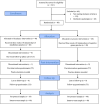Effects of Mobile App-Based Mindfulness Practice on Healthcare Workers: a Randomized Active Controlled Trial
- PMID: 36160038
- PMCID: PMC9483434
- DOI: 10.1007/s12671-022-01975-8
Effects of Mobile App-Based Mindfulness Practice on Healthcare Workers: a Randomized Active Controlled Trial
Abstract
Objectives: Amidst the COVID-19 pandemic, healthcare workers (HCWs) may be at greater risk of suffering from psychological distress compared to the general population. This study aimed to investigate the effects of mindfulness practice as delivered using Headspace on psychological and cognitive outcomes among HCWs in Singapore.
Methods: A total of 80 HCWs were recruited and randomly assigned to engage in either 3 weeks (10 min/day) of mindfulness practice using Headspace or an active control condition (Lumosity; involving playing cognitive games). Participants were administered several self-report measures and two working memory (digit span) tasks at pre- and post-intervention, and one-month follow-up.
Results: There were no significant between-condition changes on any outcome variables from pre- to post-intervention. From pre-intervention to 1-month follow-up, there were significantly greater improvements among Headspace participants on fear of COVID-19 (p = .005), compassion satisfaction (p = .007), trait mindfulness (p = .002), self-compassion (p = .005), sleep quality (p = .002), and the forward digit span task (p < .001). Several outcomes were mediated by increases in trait mindfulness or self-compassion.
Conclusions: Use of Headspace may lead to downstream benefits in reducing distress and improving psychological health outcomes among HCWs. The findings have implications for improving psychological support resources for HCWs amidst a pandemic.
Trial registration: ClinicalTrials.gov (Identifier: NCT04936893).
Keywords: COVID-19; Healthcare workers; Mindfulness; Mobile app interventions; Psychological health.
© The Author(s) 2022.
Conflict of interest statement
Conflicts of InterestThe authors declare no conflicts of interest.
References
-
- Baer RA. Self-compassion as a mechanism of change in mindfulness- and acceptance-based treatments. In: Baer RA, editor. Assessing mindfulness and acceptance processes in clients: Illuminating the theory and practice of change. Context Press; 2010. pp. 135–153.
Associated data
LinkOut - more resources
Full Text Sources
Medical

